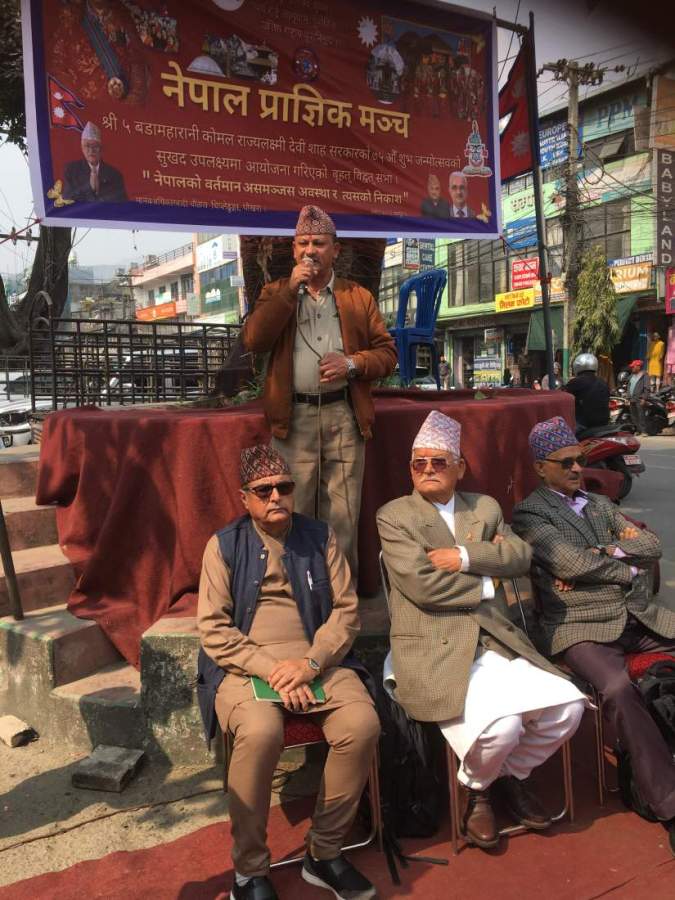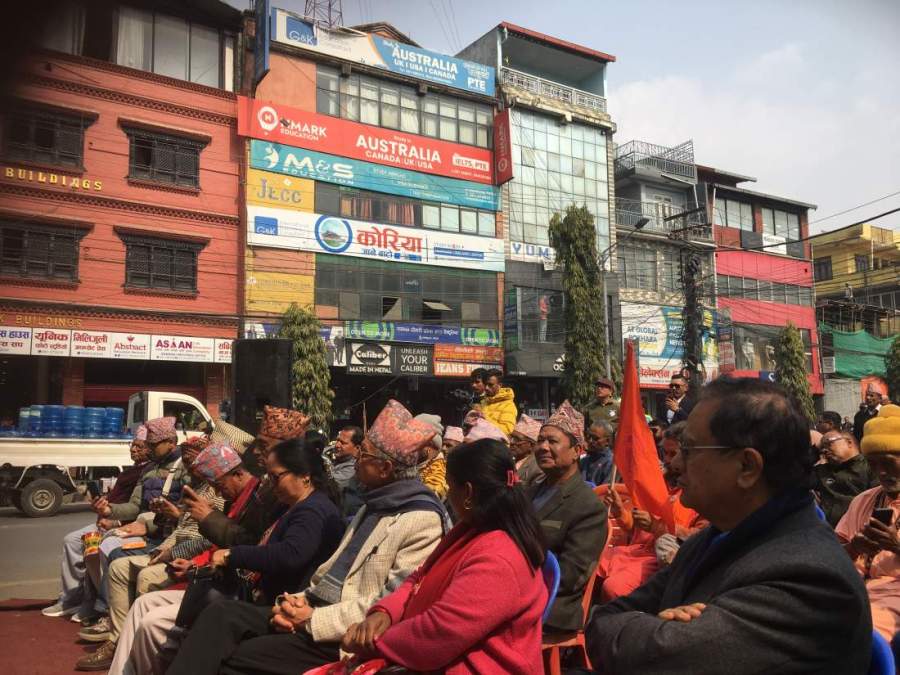

The ‘Constitutional Monarchy’ is the identity of the nation, the basis of national unity, and our pride. Restoring it is an imperative requirement of national interest. Nepalese nationhood, heritage, and culture are tied to the institution of the monarchy. It is not to be taken lightly. The removal of the constitutional monarchy is undemocratic and unconstitutional. The removal was against people’s wishes and against all the agreed terms. There was no demand of its removal in all the political movements, and the Constitution (2007 AD) does not envisage it.
The removal is accomplished by foreign interests through corrupt politicians and Maoist terror to weaken our identity, pride in our heritage, and national unity. It is to render our nation an insignificant, heritage-less, underdeveloped status to manipulate as per the whim of the outsiders through the honor-less corrupt politicians.
In geopolitical terms, we are witnessing the rise of Asian giants China and India. That means shifting the economic center of gravity to Asia and associate power centers. Thus, the West wants to Christianize Nepal and use it against China first and then against India. In this conspiracy, the Nepalese King is one of the major obstacles. So the ploy.
The Constitutional Monarchy is an important national issue. Yet, there were neither public referendums nor parliamentary \ public debates on its removal. As a matter of fact, the public poll (Ratification) taken in July 2015 on the then-draft constitution is for it. Yet, the public mandate expressed has not been honored. That is, the removal has no legitimacy. The deliberate ignoring of people’s mandate is treason and it also renders the constitution invalid.
That is the constitutional monarchy can be considered still legitimate. It is just a matter of visibly restoring it. It is also about rendering justice to the anti-national/corrupt politicians.
Our concept of monarchy does not begin with King PN Shah and ends with King Gyanendra, but includes all the kings who contributed to our national well-being and identity. The list includes kings like Janak, Yalambar, Mandev, Ansubarma, Jaya Sthiti Malla, Mahendra Malla, Pratap Malla, Ram Shah, Prithvi Narayan Shah, King Mahendra and so many others.
We must be aware of the negative narrative that King Prithvi Narayan Shah is not a unifier, but merely a conqueror. There is even the anti-national narrative that the conquering is Jatiya or of a particular community. Nothing can be further from the truth. Earlier there were no elections and democracy to criticize the military unification. All our diverse Nepalese communities participated in the unification process. That is today our nation and people proudly stand between Mechi and Mahakali, and our narrative must be about unification.
Then there were many small kingdoms, e.g. three in Kathmandu valley, in west Baise Chaubise (confederacies of twenty-two and twenty-four), and in east Chaudandi, Bijapur, etc. Given the geo-politics then the small states would not have survived. It was just a matter of time before either British India would have absorbed these petty principalities or any strong leader would have emerged and unified them. King PN Shah happened to be the personality as per the demand of history.
There is also the narrative of ‘losers and winners’ by the anti-national individuals. Really? What about democracy? There are the election winners and losers. Matter of fact, there are more losers than winners. However, the election is an integral part of the democracy. When the democracy wins all wins including the election losers. Similarly, in the unification process ultimately all wins.
The Muslim army of Bengal led by Gurgin Khan attacked in 1763 AD. The Christian army of British India led by Captain Kinloch attacked in 1767 AD. Both were defeated and chased away by King PN Shah’s army. If not for King’s victories these foreign armies would have destroyed our Sanskriti and Dharma. They would have converted Nepalese to Islam and Christianity by force, and our heritage and characteristics would have been destroyed. King PN Shah fought to save our heritage ‘Sakali Hindusthan.’ It is not about making Nepal a part of Hindusthan, but a country where we can live freely withpride in our heritage.
We are all for national sovereignty with the people expressing it through periodic democratic elections. The democracy includes the constitutional monarchy but not the absolute monarchy. On the other end, it also includes all shades of the social democrats but not the totalitarian communists.
The institution of the constitutional monarchy, neither an individual nor the absolute monarchy, is to keep the nation rooted in our heritage and be a symbol of our unity. It is to lead with ethics, morality, and Dharma. Politics is the domain of the political parties. The king remains above the politics.
King is assisted by the following five committees. The committee members are to be non-political, well-known nationalist citizens, with illustrious careers and own means of livelihood.
Royal committee: To assist the king in the issues of Dharma, public interactions, and statements. The committee will assist the king in practicing ‘Bairagya – nonattachment’ internally and ‘Karma yoga – selfless duty’ externally. If a king is not interested or cannot abide by the required discipline, the committee will help the person to abdicate and be a normal citizen. The committee will help in identifying the next king. King is of all our diverse communities. King is not only of a police but also of a thief. Politicians, police, and judges may tackle the law and justice issues, but the king will think of the welfare of even a thief.
Education committee: The king is the Chancellor of all the educational institutes. The committee is to assist the king to keep our educational system rooted in our heritage like ‘Satya bada, Priya bada,… ‘, to keep politics out, and to inculcate pride in our heritage. It
is also to guide towards higher learning, keep track of researches around the world, and identify appropriate researches for Nepal.
Army Committee: To assist the king in leading the army, to evaluate security-related intelligence and counterintelligence of internal and external threats and to identify anti- national activities.
Anti-corruption Committee: To assist the king in the anti-corruption investigations, especially in the cases of the higher, the systemic, and in the policy formulation.
Democratic norms Committee: To assist the king in keeping the democratic practice as per the benefit of the people. In simple terms, democracy means political parties presenting their programs to the people. People get to learn about the competing programs and then vote. The largest party runs the government, and the second largest party acts as the opposition for checks and balances. The committee will help the king to protect the ideal.

For example:
i. The party program should consist of national integration issues, not divisive issues.
ii. The candidates fielded must address the issue of under-representation by gender, region, community, etc.
iii. All the promises made in asking for votes must be fulfilled within the stipulated time. There can’t be irresponsible promises. E.g. if a party promises to build a road, then the party also must specify the cost and the sources of financing the project.
iv. All candidates must declare their financial standing and current and later means of livelihood.
v. If two or more parties go to an election as a joint front, then they should have a single joint program, to avoid confusion in making choices by voters.
vi. If two or more parties combine together to form a government, then their programs must have commonality to reflect people’s wishes.
vii. The corrupt practices in the election must be strictly disallowed, like over spending, gifts, and parties to the people, and asking for donations from internal and external donors with agenda.
Tilak B. Shrestha, Ph.D.
Comment